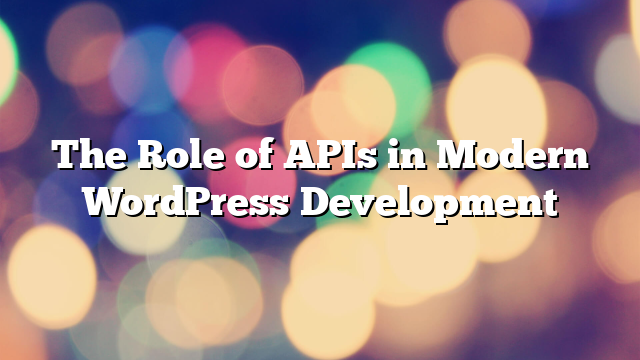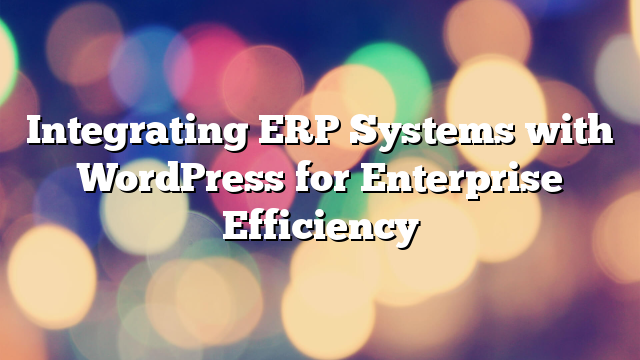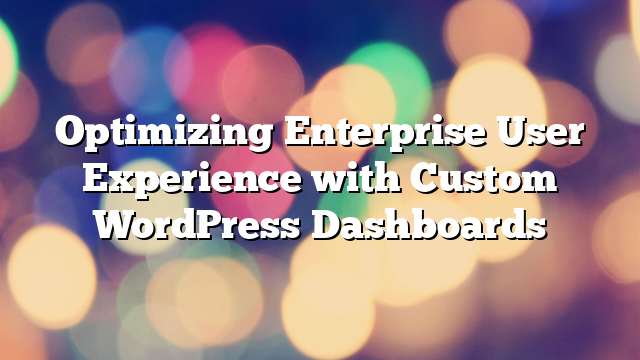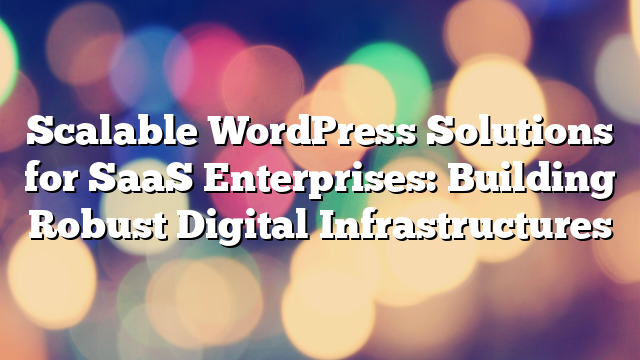The Role of APIs in Modern WordPress Development
05.12.2024

As WordPress evolves into a powerful content management system for enterprise-level applications, the importance of Application Programming Interfaces (APIs) in its ecosystem has grown significantly. APIs enable seamless communication between WordPress and other platforms, enhancing functionality, scalability, and integration capabilities. In this article, we’ll explore the role of APIs in modern WordPress development and how they empower enterprises to build dynamic and innovative web solutions.
Understanding APIs in WordPress
An API is a set of protocols and tools that allow different software applications to interact with each other. WordPress provides several APIs, each serving specific purposes, from data retrieval to custom functionality creation. The most widely used APIs in modern WordPress development include:
1. REST API
The WordPress REST API allows developers to interact with WordPress content programmatically. It provides endpoints for posts, pages, users, and other core entities, enabling seamless integration with external applications and frontend frameworks.
2. Plugin API
The Plugin API allows developers to extend WordPress functionality using hooks (actions and filters). This API forms the backbone of WordPress customization, enabling developers to add new features without altering core files.
3. Theme API
The Theme API provides tools for designing and customizing WordPress themes. It includes functionalities like template tags, the Customizer API, and widget areas, offering extensive flexibility for frontend development.
4. Custom APIs
In addition to native WordPress APIs, developers can create custom APIs to address specific business needs. These APIs can expose unique functionalities or integrate with external services.
Benefits of APIs in WordPress Development
1. Enhanced Flexibility
APIs allow WordPress to function as a headless CMS, where the backend handles content management, and the frontend is built with modern frameworks like React or Vue.js. This decoupled architecture offers greater flexibility in design and functionality.
2. Seamless Integration
With APIs, WordPress can integrate with third-party applications such as CRM systems, marketing platforms, and e-commerce tools. This enhances the overall ecosystem, making WordPress a central hub for business operations.
3. Improved Scalability
APIs facilitate the distribution of workloads between the backend and frontend, enabling better performance and scalability for high-traffic websites. Enterprises can deliver content to multiple platforms, including websites, mobile apps, and IoT devices.
4. Custom Functionality
APIs empower developers to create tailored solutions for unique business requirements. From custom dashboards to automated workflows, the possibilities are limitless.
5. Future-Proof Development
API-driven development ensures adaptability to emerging technologies and frameworks. Enterprises can update or replace frontend solutions without altering the backend.
Use Cases for APIs in WordPress
1. Multi-Channel Content Delivery
Using the REST API, WordPress content can be delivered to various platforms, including mobile apps, digital kiosks, and social media channels. This enables enterprises to maintain a consistent brand presence across channels.
2. E-Commerce Integration
APIs allow seamless integration between WordPress and e-commerce platforms like WooCommerce, Shopify, or custom solutions. Enterprises can synchronize product data, manage inventory, and streamline order processing.
3. Custom Admin Dashboards
With the REST API and Custom APIs, developers can build intuitive admin dashboards tailored to specific business workflows, enhancing user experience and efficiency.
4. Analytics and Reporting
APIs can pull data from Google Analytics, CRM tools, or other platforms to generate comprehensive reports directly within WordPress. This centralizes data analysis and decision-making.
5. Integration with Marketing Tools
Enterprises can connect WordPress with email marketing platforms, automation tools, and social media schedulers using APIs. This streamlines campaigns and improves marketing efficiency.
Challenges of API-Driven WordPress Development
1. Complexity
API integration requires technical expertise, especially when working with custom APIs or complex systems. Enterprises may need skilled developers to handle these integrations effectively.
2. Security Risks
Exposing endpoints through APIs can increase the attack surface. Implementing robust security measures, such as token-based authentication and HTTPS, is crucial.
3. Performance Overhead
API calls can introduce latency if not optimized. Caching, rate limiting, and efficient query design are essential to minimize performance bottlenecks.
Best Practices for API Usage in WordPress
1. Optimize API Requests
Use caching mechanisms and efficient data-fetching strategies to reduce server load and improve response times.
2. Secure Endpoints
Implement authentication and authorization protocols, such as OAuth or JWT, to protect sensitive data and ensure only authorized users can access APIs.
3. Use Versioning
Maintain backward compatibility by versioning your APIs. This allows for updates without disrupting existing integrations.
4. Monitor and Debug
Leverage logging and monitoring tools to track API usage, identify issues, and optimize performance.
5. Test Thoroughly
Ensure APIs work as intended by conducting rigorous testing across different use cases and platforms. Automated testing tools can streamline this process.
Conclusion
APIs play a transformative role in modern WordPress development, enabling enterprises to create dynamic, scalable, and future-proof web solutions. By leveraging the power of APIs, businesses can integrate with third-party systems, deliver content across multiple channels, and achieve unparalleled flexibility. With careful planning and adherence to best practices, enterprises can harness the full potential of APIs to drive digital innovation and success.
Looking to integrate APIs into your WordPress solution? Contact AllWebDev today and discover how we can help streamline your development process and enhance your digital strategy.



